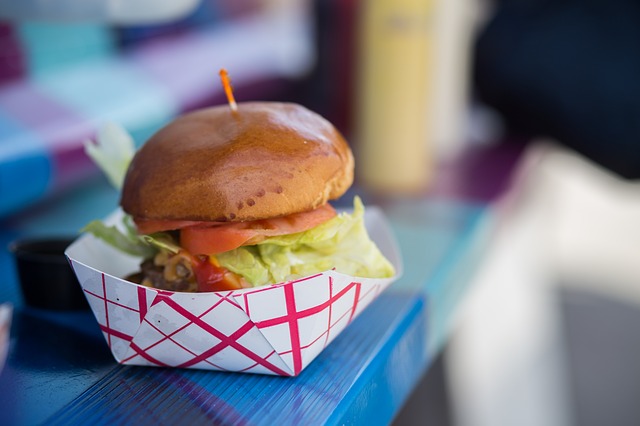It’s a classic american meal, a cheeseburger and fries, but what do you think of when you eat it?
Do you think about how each of the ingredients got to your table? Do you think about how the production of each of those ingredients has impacted the rest of the world?
If you do, you are undoubtedly in the minority. The majority of Americans want their burger and fries without a side of guilt, and they want it as quickly and cheaply as possible. Herein lies the crust of the problem according to Ellen Gustafson, cofounder of FEED and Food Tank, and the author of ‘We the Eaters’.
As the subtitle of the book says, Ellen believes that “If We Change Dinner, We Can Change the World“, and it doesn’t seem like such a far stretch when you consider that the entire way that we produce and distribute food, both locally and globally, has undergone one of the biggest shifts in history in the last 40-50 years.
While the most vocal mega corporations and organizations in our country (including government organizations) would like you to believe that all of these changes are for the “greater good”, Ellen is not afraid to peel back the layers and reveal that many of the changes our food system has undergone are for nothing more than to profit those who run it.
What Do Food Scarcity and Obesity Have in Common?
With some of the most “sophisticated” food systems in history, and phenomenal mass production and distribution of food, why is it that we still have so many hungry to feed around the world? Why are these problems not getting any better?
In America alone, 14.5 percent of Americans were considered food insecure in 2012, meaning they lacked access to enough food for an active, healthy life for all household members, yet more than one-third of all American adults are considered obese.
As Ellen says in her book:
There are currently a billion overweight or obese people in the world, and the number is escalating. There are close to a billion hungry people in the world, and another billion who are micronutrient deficient. And we can’t seem to fix these problems. – Ellen Gustafson in ‘We the Eaters’
She goes on further to explain that this phenomenon of obesity alongside hunger is not exclusive to the US. When she was in Uganda, a “pocket of extreme hunger”, she saw an alarming number of people who were obese.
What Ellen has done in this book so eloquently is to sum up how these issues are interconnected. The current food system of fast, industrialized, fattening, and vitamin depleted foods is NOT solving our global food problems, but in fact is making them worse.
A Healthy and Sustainable American Classic
As Americans, we are spoiled when it comes to food. We have been conditioned to want food that is fast and cheap, and the majority of us complain when a fast food cheeseburger costs us more than one or two dollars.
But despite spending less on food, Americans are getting sicker and fatter than ever. In 1929, the average American household spent 23.4 percent of their disposable income on food. Compare that to 13.2 percent in 1980 and 9.8 percent in 2011. Contrast this with the difference in what we spend on healthcare: 5 percent of household disposable income in 1960, which rose to 16 percent in 2008.
Our country has swapped healthy and nutritious foods that cost more and take more time, for cheap, fattening, and nutrient depleted foods that take us mere minutes to make, and it’s showing in the health of our nation.
Rounding out all of the information in ‘We the Eaters‘ about how food is produced and distributed, Ellen gives simple advice, that changing the American classic of a cheeseburger and fries, swapping out mass produced ingredients for more locally grown and sustainable ingredients, can literally change everything: our health, our waistlines, our communities, our country, and our world.
Why I Recommend ‘We the Eaters’
This is a hefty book, full of juicy facts about how are food is produced and distributed around the world. It is only for people who want the truth, no matter how rotten it is.
Yet Ellen has a unique way of putting a positive spin on each bit of chilling information, and she doesn’t leave us dripping with negativity. Alongside her bold look at the reality of our food system, she gives invaluable insight into how we can change it for the better.
In my opinion, this is one of the most important books of our time.
Not only is Ellen willing to dig down to the real truth behind the food we eat and the decisions we make as a society, but she also illustrates the big picture of how all of these things impact our entire world. We need people like Ellen who are bold enough to dream of a better world for us and for the generations before us. It all starts now.
Click here to read: We the Eaters: If We Change Dinner, We Can Change the World
**Note: I received this book as a free review copy and was not compensated in any way for the writing of this review.



This is a very thought provoking article. I confess that I am guilty of not giving a second thought to where my food actually comes from. As a culture, we are so conditioned to value convenience above everything else that we don’t care about the potential harm we are causing to our health. I am going to read this book. It is a fascinating subject.
By changing what is eaten at the dinner table is a significant approach in saving our family. I am excited about Ellen’s book, in which, I feel is a manual for our family. It really is going to take an enormous amount of effort for me to change over to a completely conscious palate.
I think more and more people are finally beginning to realize that a slow cooked meal with fresh ingredients is a healthy choice as well as a tasty one. Let’s face it, something from the local farmer’s market looks better and tastes better than some frozen or canned form of the same product. Organic is even better, and for some reason organic foods last longer too! I buy organic milk and it can go way beyond the expiration date before it goes bad.
I haven’t read the book, but look forward to the read. The grocery store that I frequent has a lot of produce from local farms, but it amazes me how much produce is from Mexico and Chile, probably other places too. Yes, those seem to be less expensive, but at what cost?
I also understand some people have a hard time managing their wallets. A $5 meal at a fast food chain is filling but just because your belly is full, doesn’t mean your body is getting all it needs. A lot of obese people are actually malnourished.
Thanks for turning me on the book!
Thanks so much for stopping by and giving your thoughts. I don’t want to be negative, so please don’t take it that way, but just a word of caution about the milk. Organic milk from the store can sometimes last longer because it is ultra-pasturized, which means most of the beneficial bacteria and enzymes in the milk is cooked out of it at high temperatures. It’s still good that you are going organic, but you might want to try (I say try, because many people don’t have enough options in their stores) to find an organic milk that not ultra-pasturized. I also completely agree about the fast food meals, and I don’t know about you, but they never seem to keep me satisfied for long because of the poor quality of fats and meat.
You do have to be cautious about unpasteurized milk, as it is very dangerous for young children, those who are pregnant, the elderly, and anyone with a compromised immune system. E. coli is the biggest thing to be aware of with raw milk, while most adults will be just fine, others can become very ill. An acquaintance of mine gave their child raw milk resulting in severe and long term health problems.
I do agree that precautions should be taken, but that is the same with any food. That being said, I wasn’t specifically talking about raw milk. There is a difference between pasturized and ultra-pasturized milk. Most conventional milks in the store are not ultra-pasturized.
I also want to point out that raw milk can be boiled at home to kill any bad bacteria present. This may be an option for those who want local or organic milk but are worried about drinking raw milk.
Coming from a farming background, I am particularly interested when someone pens a book about the provenance of our food, the intensive farming methods behind some of the food we eat now, and of course the true cost of producing this often cheap and nutrient deficient food.
I try and buy as much of my food from local farmer’s markets, and farm shops, wherever possible. I avoid all processed and convenience foods, and I feel so much healthier for doing it.
I couldn’t agree more. I know we have made a big deal this summer with the kids about growing foods that go straight from the backyard to the kitchen table. I really believe there needs to be more of an emphasis on lowering the cost of healthy foods and eliminating the necessity for chemically-made fake ingredients and foods on the shelf. It makes me sad to see the costs of factory-produced items so much lower than that of real, healthy foods, especially when so much more could be produced locally.
My parents grow many of their own veggies and often give away lettuce and marrows to neighbors and friends. It is great having fresh spinach, literally picked and potatoes too. It is so important now with allergies to pesticides and you wonder how long has the produce been in the store.
It is not only better tasting, healthier but cheaper too. I do think people should be encouraged to grow their own whenever possible.
You’ve intrigued me enough to read the book! Sounds like there are many valid and though provoking points. I am constantly amazed by the fact that the US produces such vast quantities of food, and yet there are people without enough to eat. The point of the fast vs nutritious is also so important. I’ve been trying to be more thoughtful in what I feed my family now that I have kids, and while it can be difficult to find the time for the nutritious meals, the end result is worth the time, effort, and money.
The statistics you mention are actually taking place in many countries worldwide. I am in South Africa and it is happening here without a doubt. South Africans are big meat eaters and they love fast food. It is alarming how habits have changed. Busy lifestyles must have a lot to do with this problem. You should see the size of many of our police force, It is ridiculous! We have to make changes now.
I couldn’t agree more!
This is really food for thought. I think reading this book would probably be a good idea for every household. There are so many obese families, and especially children. In my country there are special projects where nurses are going out and visiting homes and monitoring the children’s weight, eating habits, blood pressure etc. Hopefully more programs like this will help us bring about a healthier society.